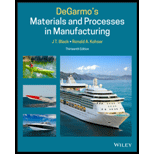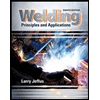
Degarmo's Materials And Processes In Manufacturing
13th Edition
ISBN: 9781119492825
Author: Black, J. Temple, Kohser, Ronald A., Author.
Publisher: Wiley,
expand_more
expand_more
format_list_bulleted
Question
Chapter 19, Problem 34RQ
To determine
The difference between the air bend and the bottoming dies.
The bending which is more flexible.
The bending which produces more reproducible bends.
Expert Solution & Answer
Want to see the full answer?
Check out a sample textbook solution
Students have asked these similar questions
Please answer the following question. Include all work and plase explain. Graphs are provided below. "Consider the Mg (Magnesium) - Ni (Nickel) phase diagram shown below. This phase diagram contains two eutectic reactions and two intermediate phases (Mg2Ni and MgNi2). At a temperature of 505oC, determine what the composition of an alloy would need to be to contain a mass fraction of 0.20 Mg and 0.80 Mg2Ni."
The triangular plate, having a 90∘∘ angle at AA, supports the load PP = 370 lblb as shown in (Figure 1).
Design a 4-bar linkage to carry the body in Figure 1 through the two positions P1 and P2 at the
angles shown in the figure. Use analytical synthesis with the free choice values z = 1.075, q=
210°, ß2 = −27° for left side and s = 1.24, y= 74°, ½ = − 40° for right side.
φ
1.236
P2
147.5°
210°
2.138
P1
Figure 1
X
Chapter 19 Solutions
Degarmo's Materials And Processes In Manufacturing
Ch. 19 - What distinguishes sheet forming from bulk...Ch. 19 - What is a definition of shearing?Ch. 19 - Prob. 3RQCh. 19 - What measures can be employed to improve the...Ch. 19 - How does fineblanking create shearing in a...Ch. 19 - Prob. 6RQCh. 19 - What types of cuts are made by squaring shears?Ch. 19 - Why might a long shearing cut be made in a...Ch. 19 - What is a slitting operation?Ch. 19 - What is the difference between piercing and...
Ch. 19 - Prob. 11RQCh. 19 - Prob. 12RQCh. 19 - Prob. 13RQCh. 19 - Prob. 14RQCh. 19 - Prob. 15RQCh. 19 - Prob. 16RQCh. 19 - What is the benefit of making dies as a multipiece...Ch. 19 - Prob. 18RQCh. 19 - Prob. 19RQCh. 19 - Prob. 20RQCh. 19 - Prob. 21RQCh. 19 - Prob. 22RQCh. 19 - When making bends in sheet metal, what is the...Ch. 19 - Prob. 24RQCh. 19 - Prob. 25RQCh. 19 - Why does a metal usually become thinner in the...Ch. 19 - Prob. 27RQCh. 19 - Prob. 28RQCh. 19 - Prob. 29RQCh. 19 - What types of operations can be performed on a...Ch. 19 - Prob. 31RQCh. 19 - Prob. 32RQCh. 19 - Prob. 33RQCh. 19 - Prob. 34RQCh. 19 - What is the primary benefit of incorporating a...Ch. 19 - Prob. 36RQCh. 19 - What is the benefit of using a urethane (rubber)...Ch. 19 - What is the objective of the roll bending process?Ch. 19 - What is the role of the form block in draw bending...Ch. 19 - Prob. 40RQCh. 19 - Prob. 41RQCh. 19 - Prob. 42RQCh. 19 - Prob. 43RQCh. 19 - Prob. 44RQCh. 19 - Prob. 45RQCh. 19 - Prob. 46RQCh. 19 - Prob. 47RQCh. 19 - Prob. 48RQCh. 19 - Prob. 49RQCh. 19 - Prob. 50RQCh. 19 - Prob. 51RQCh. 19 - Prob. 52RQCh. 19 - Prob. 53RQCh. 19 - What is the distinction between shallow drawing...Ch. 19 - What is the function of the pressure ring or...Ch. 19 - Prob. 56RQCh. 19 - Prob. 57RQCh. 19 - Prob. 58RQCh. 19 - Prob. 59RQCh. 19 - Prob. 60RQCh. 19 - Prob. 61RQCh. 19 - Prob. 62RQCh. 19 - Prob. 63RQCh. 19 - Prob. 64RQCh. 19 - Prob. 65RQCh. 19 - Prob. 66RQCh. 19 - Prob. 67RQCh. 19 - Prob. 68RQCh. 19 - Prob. 69RQCh. 19 - Prob. 70RQCh. 19 - Prob. 71RQCh. 19 - Prob. 72RQCh. 19 - Prob. 73RQCh. 19 - Prob. 74RQCh. 19 - Prob. 75RQCh. 19 - What are some of the basic methods that have been...Ch. 19 - Prob. 77RQCh. 19 - Prob. 78RQCh. 19 - Prob. 79RQCh. 19 - Prob. 80RQCh. 19 - Prob. 81RQCh. 19 - What properties from a uniaxial tensile test can...Ch. 19 - How is the formability in biaxial tension...Ch. 19 - What is normal anisotropy, R and planar...Ch. 19 - Prob. 85RQCh. 19 - Prob. 86RQCh. 19 - Prob. 87RQCh. 19 - Prob. 88RQCh. 19 - What two hot�forming operations can be used to...Ch. 19 - Prob. 90RQCh. 19 - What are the primary assets and limitations of...Ch. 19 - Prob. 92RQCh. 19 - Prob. 93RQCh. 19 - What are some of the attractive features of...Ch. 19 - What are some of the common types of press frames?Ch. 19 - What are some features that may be included into a...Ch. 19 - Prob. 97RQCh. 19 - Prob. 98RQCh. 19 - Prob. 99RQCh. 19 - Prob. 100RQCh. 19 - The maximum punch force in blanking can be...Ch. 19 - Prob. 2PCh. 19 - Prob. 3PCh. 19 - What are some of the techniques for minimizing the...Ch. 19 - Prob. 5PCh. 19 - Prob. 6PCh. 19 - Prob. 1.1CSCh. 19 - Prob. 1.2CSCh. 19 - Prob. 1.3CSCh. 19 - Polymeric materials have characteristically low...Ch. 19 - If adhesive bonding is specified as a replacement...Ch. 19 - Which of the material/process options do you feel...Ch. 19 - Prob. 1.7CSCh. 19 - Prob. 1.8CSCh. 19 - Prob. 2.2CSCh. 19 - Prob. 2.3CSCh. 19 - Prob. 2.4CSCh. 19 - Prob. 2.5CSCh. 19 - Prob. 2.6CSCh. 19 - Prob. 2.7CSCh. 19 - Prob. 3.1CSCh. 19 - Prob. 3.2CSCh. 19 - Prob. 3.3CSCh. 19 - Both materials will usually require some form of...Ch. 19 - Various design features have been incorporated...
Knowledge Booster
Learn more about
Need a deep-dive on the concept behind this application? Look no further. Learn more about this topic, mechanical-engineering and related others by exploring similar questions and additional content below.Similar questions
- Design a 4-bar linkage to carry the body in Figure 1 through the two positions P1 and P2 at the angles shown in the figure. Use analytical synthesis with the free choice values z = 1.075, q= 210°, B₂ = −27° for left side and s = 1.24, y= 74°, ½ = − 40° for right side. 1.236 P2 147.5° 210° P1 Figure 1 2.138 Xarrow_forwardcan you explain how in a coordinate frame transformation: v = {v_n}^T {n-hat} and then it was found that {n-hat} = [C]^T {b-hat} so v_n = {v_n}^T [C]^T {b-hat}, how does that equation go from that to this --> v_n = [C]^T v_barrow_forward6) If (k = 0,7 cm) find Imax for figure below. 225mm 100mm ثلاثاء. 100mm 150mm 75mm Ans: Tmax=45:27 N/cm F-400 Narrow_forward
- The man has a weight W and stands halfway along the beam. The beam is not smooth, but the planes at A and B are smooth (and plane A is horizontal). Determine the magnitude of the tension in the cord in terms of W and θ.arrow_forwardDetermine the reactions at the two supports for this plate. Express the reactions in Cartesian vector form.arrow_forwardDetermine the magnitudes of the reactions at the supports for this large plate.arrow_forward
- Only expert should solvearrow_forwardA 15 cm-OD pipe is buried with its centerline 1.25 m below the surface of the ground [k of soil is 0.35 W/(m K)]. An oil having a density of 800 kg/m³ and a specific heat of 2.1 kJ/(kg K) flows in the pipe at 5.6 L/s. Assuming a ground surface temperature of 5°C and a pipe wall temperature of 95°C, estimate the length of pipe in which the oil temperature decreases by 5.5°C. + Tε = 5ºC Z= 1.25 m D= 15 cm 7p=95°Carrow_forwardFind the solution of the following Differential Equations 1) 4y+y=0, y(0)=2, y'(0) = 0. 2) y+y=0, y(0) = A, y'(0) = B. 3) "+2y'-8y=0, y(0)=1, y'(0)=8. 4) y"-2y-3y=0, y(0)=1, y'(0)=7. 5) y"-ky' =0, y(0)=2, y'(0) =k. 6) y+ky'-2k2y=0, y(0)=2, y'(0) = 2k. 7) y'+4y=0, y(0)=2.8 y+y-17sin(21) y(0)=-1. 9) y-y'-6y=0, y(0)=6. y'(0)=13. 10) y-y=0, 11) y"-4y+4y=0, y(0)=4, y'(0) = 0. y(0) = 2.1, y'(0)=3.9 12) y+2y+2y=0, y(0)=1, y'(0)=-3. 13) "+7y+12y=21e", y(0)=3.5, y'(0)=-10. 14) "+9y=10e", y(0)=0. y'(0) = 0. 15) y+3y+2.25y=91³ +64. y(0)=1, y'(0) = 31.5 16) "-6y+5y= 29 cos(21), y(0)=3.2, y'(0) = 6.2 17) y+2y+2y=0, y(0)=0, y'(0)=1. 18) y+2y+17y=0, y(0)=0, y'(0)=12. 19) y-4y+5y=0, y(0)-1, y'(0) 2. 20) 9y-6y+y=0. y(0)=3, y'(0)=1. 21) -2y+10y=0, y(0)=3, y'(0)=3. 22) 4y-4y+37y=0, (0) 3. y(0) 1.5 23) 4y-8y+5y=0, (0)-0, y(0) 1. 24) y+y+1.25y=0, y(0) 1. y'(0) -0.5 25) y+y=2 cos(1). y(0) 2. y'(0) = 0. 26) -4y+3y=0, (0)-3, y'(0) = 7. 27) y+2y+y=e", y(0)-0. y'(0) = 0. 29) 28) y+2y-3y-10sinh(2),…arrow_forward
- Note: Please provide a clear, step-by-step simplified handwritten working out (no explanations!), ensuring it is done without any AI involvement. I require an expert-level answer, and I will assess and rate based on the quality and accuracy of your work and refer to the provided image for more clarity. Make sure to double-check everything for correctness before submitting appreciate your time and effort!. Question:arrow_forward4. Block A and B are two different pieces of wood. Determine the minimum dimension for "a", if the shear stress of the wood is 50Mpa. The thickness of the wood is 30cm. 600N Aarrow_forward1. Determine the reaction force at A. 60 kN 5 B 1 m 1 m- -1 m 4 3 m 30 kN marrow_forward
arrow_back_ios
SEE MORE QUESTIONS
arrow_forward_ios
Recommended textbooks for you
 Welding: Principles and Applications (MindTap Cou...Mechanical EngineeringISBN:9781305494695Author:Larry JeffusPublisher:Cengage Learning
Welding: Principles and Applications (MindTap Cou...Mechanical EngineeringISBN:9781305494695Author:Larry JeffusPublisher:Cengage Learning

Welding: Principles and Applications (MindTap Cou...
Mechanical Engineering
ISBN:9781305494695
Author:Larry Jeffus
Publisher:Cengage Learning
Everything About TRANSVERSE SHEAR in 10 Minutes!! - Mechanics of Materials; Author: Less Boring Lectures;https://www.youtube.com/watch?v=4x0E9yvzfCM;License: Standard Youtube License